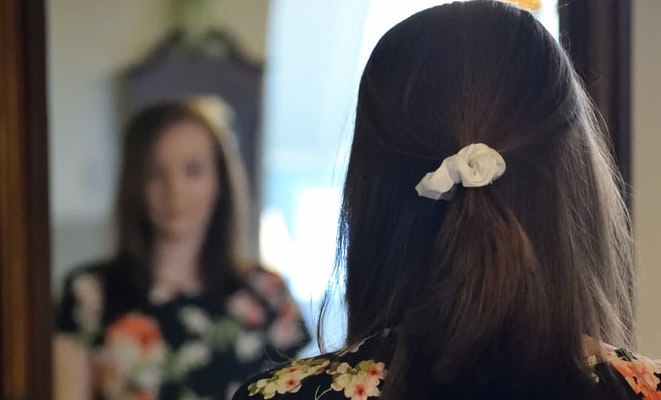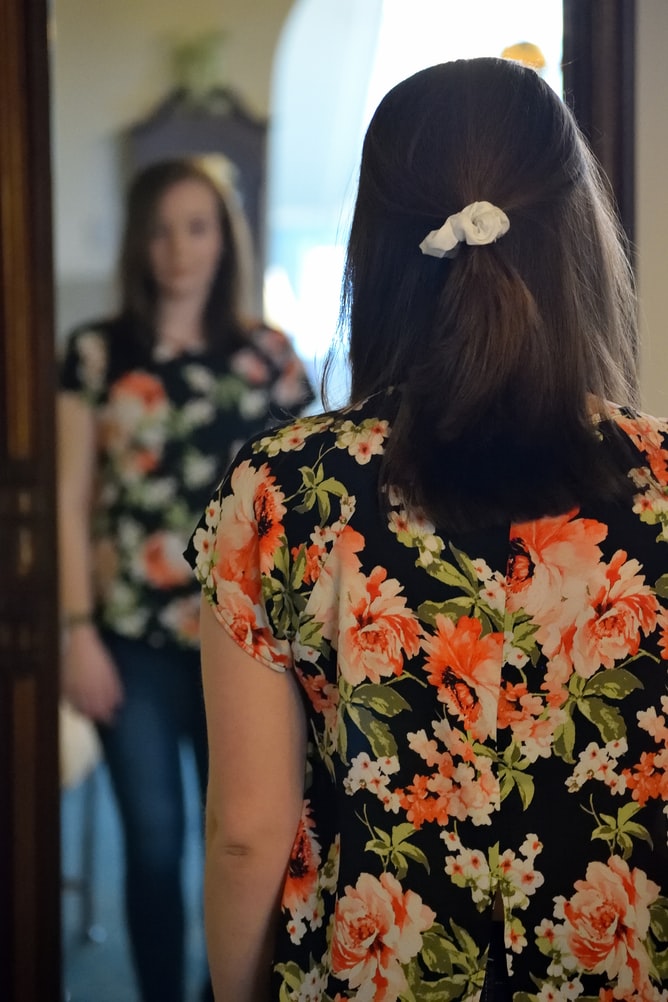
What’s with all the negative self-talk?
Did you know the way you talk to yourself plays a big role in your health and in your relationship with your body?
According to the Mayo Clinic, positive thinking has health benefits including:
- Increased life span
- Lower rates of depression
- Better psychological and physical well-being
- Better cardiovascular health and reduced risk of death from cardiovascular disease
- Better coping skills during hardships and times of stress
Interestingly, even the choice of words you use to address yourself in your thoughts play a role in your ability to keep your thoughts more rational and less emotional. Researchers from the University of Michigan found that by using third person pronouns (you, they, she, he, them, etc) instead of “I”, or referring to yourself by your own name created more self-distancing in decision making. This means people were able to step back and be more rational because they were more likely to see themselves separate from their emotions and evaluate the situation more objectively.
The researchers found that people were also kinder to themselves in their self-talk and decision making when talking to themselves in one of these ways. A good way to understand this is to imagine if in your body image meltdown moments (we all have them…) you were able to see yourself as you would see a loved one in pain, instead.
How would this affect your decision to have cruel or shame-filled thoughts about yourself? Certainly your negative thoughts are things you would never say to someone else when they are hurting, so why do you say those things to yourself in your time of need?
The problem of negative self-talk, particularly when it comes to our bodies, is driven by diet culture and the expectations we put on ourselves to always be working towards a “better” body. These beliefs are then normalized when we spend time with friends or family bashing our bodies together or talking about how “bad” we’ve been at sticking to our dieting or healthy eating. Think about it, when was the last time you had a conversation like this with someone?
Even though this comes down to our personal health, which is influenced by a huge number of factors, body and diet bashing ourselves is a completely normal topic of discussion in our everyday life. In fact, this type of talk brings us together and makes us feel a sense of community, and as humans we like that, even when the outcome may be poorer self-care.

Another way we bond that reinforces our negative self-talk is the way we talk about other people and their bodies. Instead of allowing each other to just exist, we project our own body issues into shaming other people.
Have you ever had thoughts like:
- “At least I don’t look like that person…”
- “I’m sad seeing that person eat that unhealthy food, they obviously have no self control.”
- “I can’t believe that person is wearing THAT, don’t they realize what they look like??”
Thoughts like this come from our own fears. It’s hard for us to even imagine ourselves feeling confident in bold clothing choices or eating whatever we want in front of other people, so we jump to judgement. Especially judging people who live in larger or different bodies than we do. Especially when they are confident and comfortable in their own skin.
Why? I think we are just a little bit jealous of people who can do the things our own body insecurities are keeping us from doing ourselves. And to be clear, I am not saying this to make you feel shame. Instead, I hope this can be a learning experience about how diet culture influences our behavior around our health and our perception of the health of those around us.
Another unfortunate side effect of this habit of discussing other people’s bodies is when you hear your closest friends and family shaming other people for being different, it reinforces your body fears. To you, your belief that you have to be smaller or have a “good looking body” to be acceptable is confirmed in these conversations.
In addition, being congratulated on weight loss or comments about how great you look now (that you’ve lost weight) also reinforce our harsh body beliefs. Although not intentional on the part of friends and family, these comments confirm your diet culture belief that you are more valuable or “better” in a smaller body.
FYI: when you congratulate someone on weight loss without knowing the full story of how it happened, you could inadvertently be congratulating someone on weight loss caused by things like cancer, other chronic diseases, depression, extreme dieting or even an eating disorder.
What if we just stopped talking about each other’s bodies?
If you are remembering all the times you have participated in conversations like these and feeling bad, please also remember it’s not your fault. Really!
One of the things I find myself often reminding clients of is that we have ALL grown up with YEARS and YEARS of exposure to diet culture rules and behaviors that were so normalized, we didn’t even realize how they could be hurting us and other people. There is a lot to unlearn. Especially because so much of the messaging is so subtle, we don’t even realize how it connects to our own body shame.


Have you ever realized that in most commercials and advertisements, thin or fit, able-bodied, mostly white young people are typically used to sell products? I’m thinking of the many beer commercials where a big group of fit, happy, young adults are having a party on a beach and enjoying their light beers, because health, duh. This Michelob Ultra commercial is a GREAT example of what I’m talking about.
What is the messaging? If you drink Michelob Ultra, you too can feel young, fit, healthy, and happy. Which is obviously the ideal way to look and feel. PLUS to throw in a little more diet culture: our beer has HALF THE CARBS of Corona Extra, which is great because carbs are sooooo off limits if you’re hoping to ever look like these fun people!
Wow… did you even realize 15 seconds of video could give you all that ammo to take and use against yourself later in your own body and diet shaming? Now think about just how much messaging like this you’ve consumed throughout the day, every day, for YEARS. It’s everywhere.
Here are a few great ways you can start working on improving your self-talk.
- Work with someone who can help you identify the key moments in your life that have influenced your current diet and body image beliefs and figure out how to overcome those barriers to work towards more body respect. Luckily you’re in the right place because I can help you do this: CLICK HERE to learn more!
- Become aware of the diet culture influences in your everyday life. Who you follow on social media, what you see on TV, and even the conversations you have daily with friends, family, and coworkers can influence the beliefs you have about your own diet and body. Simply becoming aware of these influences is a huge step towards more body respect and better self-talk.
- Even better, change the things you can change. Constantly comparing yourself to “better” bodies, weighing yourself, and negative self-talk are great places to start because you have some control over these actions. Another HUGE one I would challenge you to start changing right now is what you are consuming through social media. Following a bunch of instagram accounts covered with pictures of bodies you someday want to finally attain, but would have to extreme diet or over-exercise to achieve, is NOT “fitspiration”. It’s actively harmful to you, your health, and your ability to have a healthy relationship with your body. Instead, diversify your feeds. Follow people living their lives in bodies that look like yours AND in a variety of bodies different than yours. Normalizing all bodies will help you give yourself the respect you deserve, too.

One final thing: these negative and hateful beliefs you have about your body? They are NOT true. You are valuable NO MATTER what size, weight, or shape you are. You deserve to take up all the space you need. You deserve to care for and pamper yourself just the way you are today. You deserve to be joyful in your life and give up tying your worth to a certain size of jeans or a number on the scale.
Today, try to appreciate yourself for who you are and appreciate your body for the amazing things it helps you do every day (even if that is just getting through it right now).
You got this.
— Lauren
2 thoughts on “What’s with all the negative self-talk?”
Comments are closed.
<3 thank you for this! I Enjoyed reading this.
Excellent insight. A new way to think.